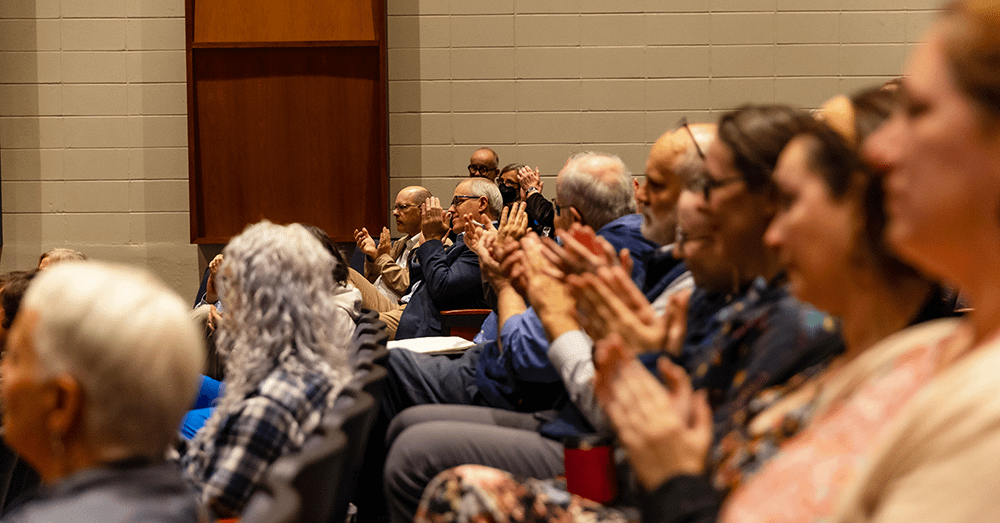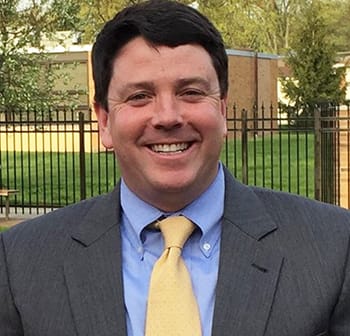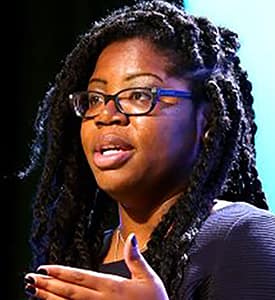Faculty poet Delanty acts on beliefs at Dakotas protest
The lessons of poetry and liberal arts education really start to mean something when students “act on their knowledge,” says Greg Delanty of the Saint Michael’s English faculty, who for many years has been the College’s poet in residence.
Delanty, an internationally celebrated Irish poet and longtime environmental activist, showed students what “acting on knowledge” looks like over this semester’s Thanksgiving break: He rode a bus with fellow activists, 37 hour each way from Vermont to the Standing Rock reservation in South Dakota, to spend a week among thousands who camped out on the frozen plains amid human and elemental hardships to protest a proposed oil pipeline through Native American lands there.
The professor-poet brought with him a poster created by his Saint Michael’s students who share his concerns on the issue, and at times he displayed it as he joined in several civil disobedience initiatives during which others were injured by police actions against the protesters. He stood firm in the face of rubber bullets, concussion grenades, pepper spray and aggressive police, even though it was quite unsettling.
At other less tense times, Delanty attended civil disobedience training and pitched in to the makeshift community of teepees and tents, as needed – cooking at community stations, stoking fires, riding a generator-bike (Delanty is known for biking to Saint Michael’s in all weather) so others could charge their phones, reading and writing poetry — and simply being present as tangible witness to his beliefs on what he sees as the most serious issue of our time:
“Like many, others I have always been concerned on the state of the world, and the most urgent issue is the planet itself and what the fossil fuel industry is doing to it,” Delanty said. “We’re running out of time, and I’ve been involved as an activist for years — I write about it in my poems. It’s all part of a life, really. Poetry is not a career so much as a way of being alive in the world.”
Delanty writes poems about global warming and many other topics, and says his poems and protests are “all one part of a piece,” explaining: “This was just one event in a long stream of events I’ve been involved in.” For instance in 2011 with the group 350.org and some students under inspiration from Vermont writer/activist Bill McKibben, he was arrested outside the White House along with many others while protesting against the tar sands pipeline, which eventually was stopped. He also helped found the campus Environmental Council more than a decade ago, and still is its moderator.
His closest call to danger in South Dakota came on Thanksgiving when a group of civil-disobedience demonstrators that he was with, led by a Lakota elder and other Native Americans on horseback or in canoes, made their way toward Turtle Island in a river within reservation lands where the pipeline had been slated to go. “There was a real possibility the police would fire, so we were there standing under shields. Some people wanted to go up the hill for a direct confrontation, but the Lakota leaders, whose lands we were on as guests, asked us not to so we stayed back. I was frightened, but I did it anyways. When you do something, you try to do it properly.”
Delanty is first to admit that he is not by nature or inclination born to either camping or protesting, and he wasn’t thrilled about having to go a week without a shower and sleeping on cold ground in a tent – yet he feels an imperative to leave his immediate physical comfort zone sometimes in service of following his conscience, given the longer-term internal satisfactions that brings. It’s something he discusses with his poetry students, he said, adding that, this semester in particular at Saint Michael’s, such a discussion feels especially pertinent, with students confronting challenging post-election campus issues through activism.
He said he was thankful to the Saint Michael’s community for their support of his activism in various ways, including funding, equipment and provisions; and to student Olivia Marr, a member of the campus student group Green-Up, who made the poster for him to bring to South Dakota.
“When I do poetry with the students — say WB Yeats and his poem The Second Coming, which contains the famous lines ‘The best lack all conviction, while the worst/ Are full of passionate intensity” — I show them how to look past what seems like the difference of time and space between Yeats and our times and issues. Soon, they see he’s talking about them as well. It breaks through the veneer of difference to see the sameness — that we’re more the same than different. We’ve learned as human beings to categorize everyone by difference – black/white, Irish/English, woman/man – but what poetry and literature does is to break through that veneer of difference to see how much the same we are, whether that’s in love-life, friendship-life or public-political life.”





